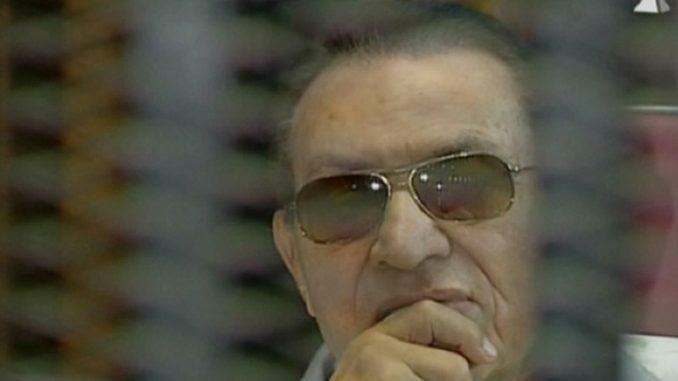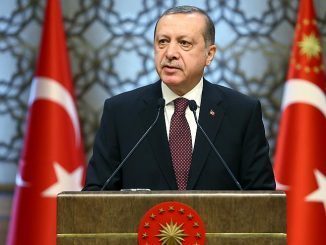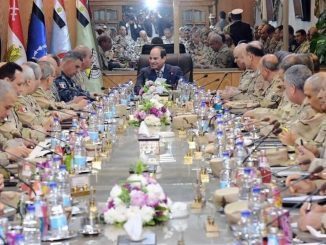
The Egyptian National Action Group said that the provocative manifestations that accompanied Mubarak’s death are an attempt to announce the death of the January revolution
The Egyptian National Action Group (ENAG) said in a statement it released Wednesday that it strongly condemns the circumstances accompanying the death of the ousted President Hosni Mubarak, as “the regime institutions took advantage of this occasion to openly declare cutting off all links to the blessed January 25 revolution through showing exaggeration in honoring a president that the Egyptian people had revolted against to end the dictatorial rule that lasted for nearly thirty years.”
ENAG said that during the Mubarak era, the Egyptian nation experienced almost all kinds of political and human rights violations, corruption, and financial and administrative failure, which pushed the people to revolt against him, in attempt to change these conditions and liberate Egypt from corruption and tyranny.
The group, which includes Egyptian opposition figures both at home and in exile, said that “The provocative manifestations of announcing official mourning and giving the dictator a state military funeral in which the head of the regime participated amid extensive media coverage, is a cheap attempt by the ruling regime to announce the death of the January 25 revolution (2011) with all its noble goals and values,” the statement read.
The January revolution has been able to achieve only one of its goals by removal of the head of the regime at the time, Mubarak, but it could not eliminate the deep state that managed to reproduce itself more fiercely than before through Sisi’s “bloody military coup that has committed and is still committing all types crimes on a daily basis, including executions, extrajudicial killings, enforced disappearances, and the arrest of any one that attempts to express his opinion”.
ENAG statement said “the biggest crime remains the attempt to assassinate what has remained of the January revolution that broke out against the Mubarak era that laid the foundations of all that our nation is currently undergoing of injustices and complete demolition of aspects of political and democratic life, depriving the Egyptian people of exercising the simplest human rights that most people of the world enjoy.”
Concluding its statement, ENAG, which expresses various spectra of Egyptian society, confirmed that “the spirit of the January revolution is still lurking in the hearts of Egyptians, and the day will soon come when the people rise and make the whole world hear its final word, and remove the tyrants that are weighing heavily on the Egyptian nation,” the statement read.
Mubarak died at the age of 91
Hosni Mubarak, the longtime autocrat ousted in Egypt’s 2011 revolution, has died in Cairo’s Galaa military hospital aged 91.
Mubarak’s son Alaa had in recent days detailed on social media the former president’s worsening health following surgery and confirmed his father’s death on Twitter.
The former air force commander first came to power in 1981 after the assassination of his predecessor Anwar Sadat, and ruled for 30 years until huge popular protests forced him from office.
Though he was then jailed facing a number of charges, Mubarak was acquitted of most of them and freed in 2017, with Egypt now under military rule. He was originally convicted in 2012 for conspiring to kill 239 demonstrators during the 18-day uprising and sentenced to life in prison.In a statement, the presidency called Mubarak a “military leader and war hero”, and offered his family condolences. Meanwhile, the armed forces described him as “one of its sons and a war leader”.
Mubarak’s rule was renowned for its autocracy and cronyism, and his administration kept close ties with Washington, from whom Egypt received billions in military aid.
He also maintained tacit relations with neighbouring Israel, and was lauded by Israeli Prime Minister Benjamin Neatnyahu on Tuesday.
“On behalf of the citizens and government of Israel, I would like to express deep sorrow on the passing of President Hosni Mubarak. President Mubarak, my personal friend, was a leader who led his people to peace and security, to peace with Israel,” Netanyahu said in a statement.
Vast protests against his rule centred in Cairo’s Tahrir Square finally forced Mubarak from office in February 2011, with Egypt’s first democratically elected leader Mohamed Morsi voted in the following year.
However, Morsi was also removed in a 2013 coup that ushered in a new period of military rule under President Abdel Fatteh el-Sisi that critics say is even more autocratic and repressive than Mubarak’s.
Though Mubarak was freed, Morsi died after collapsing in court last year, following years of detention in harsh conditions that were deplored by rights groups.
Ayman Nour, who ran against Mubarak in the 2005 presidential election, told Middle East Eye he had been jailed by the autocrat, “as a punishment for that decision”.
“Confronting people while they are alive is different from after their death. Therefore, personally I forgive Mubarak for his injustice towards me,” he said.
“However, concerning his injustice towards Egypt and the rest of the Egyptians, he is now going to face divine justice.”
Amr Darrag, a former minister and politician who opposed Mubarak and helped draft the first constitution after the president fell, bemoaned the lack of justice in Mubarak’s trials.
“We will always remember that Mubarak is directly responsible for the collapse of political life and enshrining corruption throughout the 30 years of his rule,” he told MEE.
Those sentiments were echoed by Islam Lotfy, a leading member of the youth alliance that organised the 2011 Tahrir Square protests.
“I am sad not because he died but because he passed away without receiving a fair trial for his responsibility for corrupting political and economic life in Egypt and the country’s failure on all fronts,” he told MEE.
“My only regret is not having a judicial system that prosecuted him for his crimes. The trials against him after 2011 have been no more than a farce aimed at containing people’s anger.”
Dr Wael Haddara, who served as senior advisor to Morsi, said Mubarak was a prototype for “a particular kind of Arab leader”.
“He demonstrated how one man can rule for 30 years while accomplishing nothing for his country, building nothing and leaving a legacy of nothing, but corruption and waste,” he said.
“The contrast in the treatment he received compared to that meted out to President Morsi both in life and death is a stark reminder of the immense injustice plaguing Egypt today.”
But far from a legacy of nothing, Amr Khalifa, an Egyptian journalist and political analyst, said those working in politics in the Egyptian sphere are still suffering from Mubarak’s “systemic decimation of the political class”.
“Any efforts to build a political body to stand against the monolith of army rule runs into that Mubarak Bar-Lev line,” said Khalifa, referring to the fortifications Israel built along the Suez Canal during the 1967 Middle East war.
“The Egyptian intelligentsia, for the most part, is inexperienced because the highly strategic Mubarak made sure it would be so.”
Osama Gaweech, an Egyptian journalist and presenter at Al-Hiwar TV channel, told MEE he was happy for one of the region’s dictators to be gone, but he, too, sees Egypt very much in the shadow of Mubarak.
“The problem is that he left a political legacy … and this legacy led to the current military regime. We can’t separate between these two regimes. It’s continuous between Sisi and Mubarak.”
Nonetheless, Gaweech said he will always be proud that he demonstrated against Mubarak. “We will tell our children what we did to this tyrant. We put Mubarak in jail. With a corrupt judiciary and the military and the police, he became free…but we succeeded to force him to step down and we are all proud of that.”
A military source told Reuters that the former air force officer will be buried in a military funeral, with the timing unclear.



